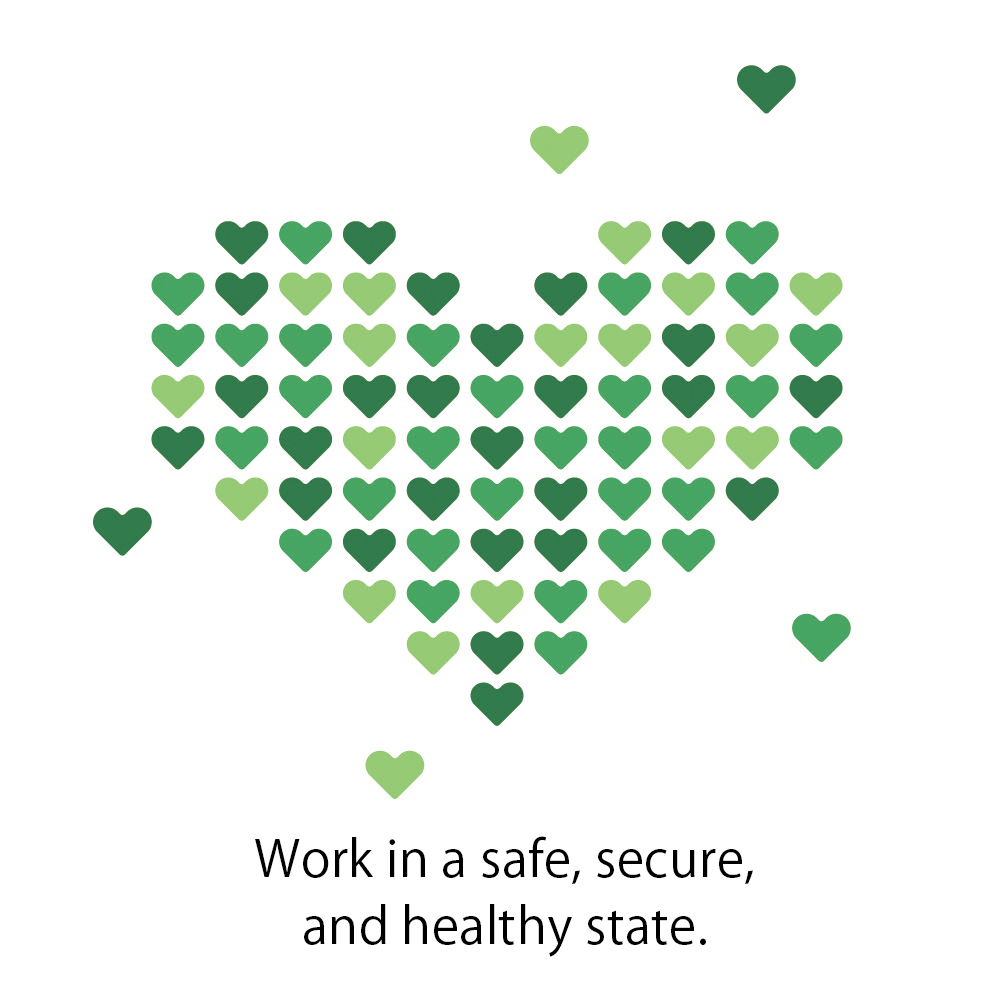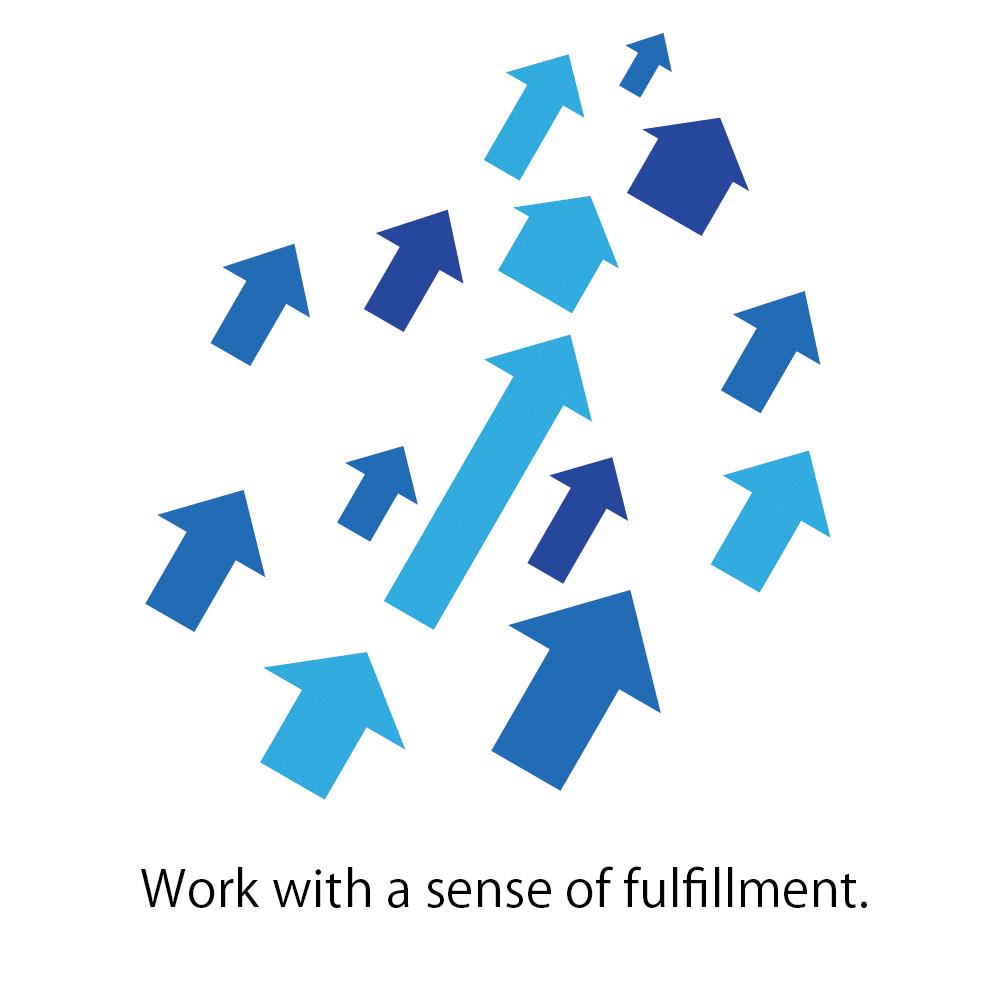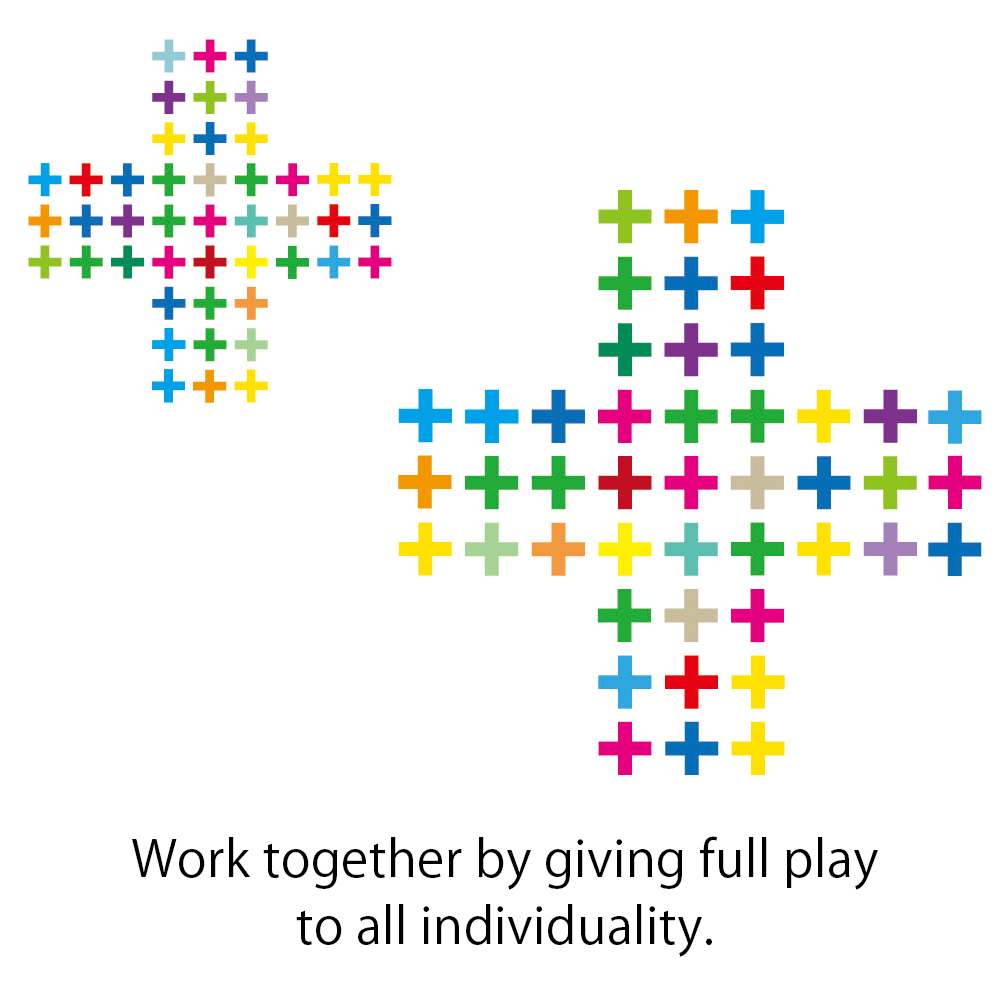DEI and Employees’ Well-being
In October 2022, the Panasonic Group announced that it was undertaking initiatives aimed at achieving stable well-being for diverse employees.
What is employees’ well-being?
A state in which each and every employee is in good health, both mentally and physically, and feels happy and fulfilled in their work through opportunities to take on new challenges
What is employees’ well-being, a concept which also encompasses DEI initiatives?
Since its foundation, in line with the management philosophy of founder Konosuke Matsushita, the Panasonic Group has been committed to the concept of human capital management, which regards human resources as important capital. Over the years, we have made a range of pioneering efforts. For example, we were one of the first companies in Japan to introduce a five-day workweek, provide support for childcare and nursing care, and put in place a remote work system.
As the social environment is rapidly changing and values are diversifying, measures for human capital management must be continuously updated in response to these changes.
In order for our employees with diverse individualities to actively take on challenges and thrive in everything they do, the Panasonic Group is committed to creating an environment and framework where each and every employee can always maintain a state of well-being. By this, we mean that they are both mentally and physically healthy and feel happy and fulfilled in their work as a result of having opportunities for taking on new challenges.
The Panasonic Group aims to create “an ideal society with affluence both in matter and mind.” To achieve this, we must strengthen the competitiveness of our individual businesses. The means to achieve this is our autonomous responsible management system, which relies on the entrepreneurship of each and every employee and participative management through collective wisdom.
In this context, we hope to create a culture in which each and every employee in the Panasonic Group resolutely takes on challenges with a strong sense of autonomous responsibility, and a culture of open discussion within which it is normal for all employees to share their wisdom with each other.
The prerequisite for both a strong sense of autonomous responsibility and a culture of open discussion is employees’ well-being.

We aim to create a society where each and every customer can live and work comfortably and with peace of mind, and where they can be happy and healthy, both mentally physically—in other words, where they can be in a state of well-being. As we aim to help bring about such a society, it is our duty as a company to begin by aiming to ensure the well-being of the approximately 240,000 global employees of the Panasonic Group, with their diverse individualities and abilities. We believe that this is the starting point for creating an ideal society with affluence both in matter and mind.
Three pillars supporting employees’ well-being
In order to ensure the well-being of employees, the Panasonic Group is promoting initiatives under the following three pillars, with DEI initiatives coming under the third pillar.

Creating a safe, secure, and healthy workplace

Encouraging employees’ self-motivated endeavors and supporting their self-determined career formation

Promoting Diversity, Equity & Inclusion (DEI)
This comes under the first pillar: “Work in a safe, secure, and healthy state.”
As the pillar suggests, this means the creation of safe, secure and healthy workplaces.
- Development of a safe and secure work environment
- Respect for human rights and compliance
- Promotion of health initiatives
(Encourage people to be healthy and active)

This comes under the second pillar: “Work with a sense of fulfillment.”
To encourage people to take on new challenges through their work, for example, we will promote the exchange of human resources among the group’s operating companies through open recruitment.
Also, we will create opportunities for individuals to realize their own potential as follows:
- Creation of opportunities for side jobs and skill development
- Greater choice of working hours and locations
We believe that encouraging employees’ self-motivated endeavors and supporting their self-determined career formation through these measures is the very essence of the practice of management that maximizes the potential of each employee and the Basic Business Philosophy, and that they represent an endeavor to transcend organizational boundaries to optimize human resources and enable them to thrive, thereby enhancing business competitiveness.

This comes under the third pillar: “Work together by giving full play to all individuality.”
The Panasonic Group is promoting the Diversity, Equity & Inclusion (DEI) initiatives described on this website.
- Top Management Commitment
- Creating an Inclusive Work Environment
- Support for Every Individual

Greater options for adopting different work styles
This part focuses on initiatives in the Japan region.
Of the three pillars supporting employees’ well-being, we will introduce initiatives to expand work style options related to “2. Work with a sense of fulfillment” and “3. Work together by giving full play to all individuality.”
The Panasonic Group aims to maximize results by accelerating innovation and strengthening competitiveness through improving productivity from an organizational perspective and realizing well-being from an individual perspective.
From an organizational standpoint, it is not a question of opting for either face-to-face or remote work, but of optimizing the balance between both work styles according to the situation of each business and the field in which each person is involved, which will lead to improved productivity.
In this regard, the expansion of options in terms of working hours and locations is a means of realizing well-being from the perspective of the individual.
There are many employees within the company who are willing to take on new challenges despite their various circumstances. For example, some employees may want to continue fulfilling their current roles, even though circumstances make it difficult for them to work full time for the present, while others may want to gain more skills and advance their careers, or perhaps broaden their horizons by working outside the company and learning new things that they can apply to their current jobs. We will continue to expand options in terms of working hours and locations so that everyone can take on challenges and grow, enabling them to continue to pursue their careers without having to give up.
*The approaches and content of systems differ among Panasonic group companies.
Improving productivity
Hybrid approach with an optimal combination of face-to-face/remote work

Innovation, collaboration, human resources development, etc.

Information sharing, preparation of analytical documents, routine work, etc.
Realizing well-being
Boost growth and connect careers

- Challenge of self-determined career formation
- Responding to the needs and circumstances of each individual

- Challenge of self-determined career formation
- Support for balancing life events and career
Examples of possible future work styles
The Panasonic Group will respond attentively to diverse needs by creating systems and other things that encourage personal career development and allow employees to achieve a better work-life balance, and will expand work options so that each and every employee can be their own person and take on their own challenges.
*These are just some examples from the Japan region. The actual cases are expected to vary among Panasonic group companies.
For employees who want to take on the challenge of self-determined career formation, such as side jobs, volunteer work, self-study, etc.
For example, the following work style is possible
I’d like to experience another company’s worksite to broaden my professional knowledge.


Working four days a week to take on a side job at another company
For example, the following work style is possible


Without reducing working hours, taking on a side job from parents’ home outside of commuting distance
For more information, please see
For employees who want to balance life events and career, such as childcare or partner relocation
For example, the following work style is possible
My partner has been transferred, and it’s impossible to raise two children alone.


For more information, please see
For example, the following work style is possible


Fully remote work four days a week while caring for parents at their home outside of commuting distance
For more information, please see
*These are just some examples from the Japan region. The actual cases are expected to vary among Panasonic group companies.
Related information:



